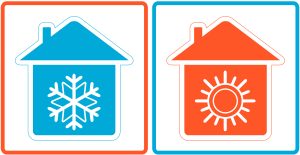Your heat pump is one of the most versatile and energy-efficient systems in your home, capable of keeping you cool in the summer and warm in the winter. However, when your heat pump refuses to switch between heating and cooling modes, it can leave you frustrated and uncomfortable. This issue is more common than you might think and could stem from a variety of causes.
Below, we’ll explore the reasons your heat pump might get stuck in one mode and when it’s time to call the professionals at Peaden for help with HVAC repair in Niceville.
Common Reasons Your Heat Pump Won’t Switch Modes
Thermostat Problems
Your thermostat is the brain of your HVAC system, sending signals to the heat pump to change modes. If the thermostat is malfunctioning or incorrectly programmed, it may fail to tell the heat pump to switch modes. Low batteries, loose wiring, or outdated technology could all contribute to the issue.
Check that your thermostat is set to the correct mode and temperature. If it’s unresponsive, try replacing the batteries or resetting the device. For older thermostats, consider upgrading to a smart model for more precise control.
Reversing Valve Malfunction
The reversing valve is a critical component of your heat pump that allows it to change between heating and cooling. If this valve is stuck, damaged, or not receiving the right signal, your heat pump will remain in one mode. This is a technical repair that requires the expertise of an HVAC professional.
Refrigerant Levels Are Too Low
Refrigerant is vital for your heat pump to transfer heat effectively. Low refrigerant levels can lead to reduced performance and cause the system to struggle when switching modes. This often occurs due to a leak in the system.
If you suspect a refrigerant issue, do not attempt to add refrigerant yourself. Handling refrigerant requires specialized training and equipment, so call a licensed technician.
Electrical or Control Board Issues
Heat pumps rely on a series of electrical components and a control board to manage switching modes. A blown fuse, damaged relay, or faulty control board could prevent the system from operating correctly.
Diagnosing electrical issues requires professional tools and knowledge. Attempting DIY repairs could worsen the problem or even cause safety hazards.
Seasonal Maintenance Neglect
Skipping routine heat pump maintenance can lead to a buildup of dirt, grime, and wear on essential components. Over time, this neglect may cause the system to lose efficiency or fail to switch modes properly.
Regular maintenance ensures all parts of your heat pump, including the reversing valve and refrigerant levels, are functioning as they should.
When to Call a Professional
While some minor issues, like adjusting the thermostat, can be addressed on your own, most heat pump problems require the expertise of a licensed HVAC technician. If your heat pump:
- Refuses to switch modes despite troubleshooting,
- Makes unusual noises when attempting to change modes,
- Shows signs of refrigerant leaks or ice buildup,
It’s time to contact Peaden. Our trained professionals have the tools and experience to diagnose and repair your heat pump quickly and effectively. Contact us today to schedule an appointment for heating or AC repair and restore comfort to your home.

